 |
This is a story about an
international couple raising and home educating three
young boys in Japan, while dealing with
climate, cultural, and personal challenges. These pages
are about pretty much anything and everything all guided
by our family motto, Taking Chances, Making Changes,
Being Happy. Thank you very much for joining us on our
ongoing adventure.
Comments or questions about this blog?....message me at
Facebook. |
|
|
|
|
|
| |
 Fun
Music, Fun
Music,
Well same as Jpop, Kpop is not for everybody. As with
much of the music I listen to, I cannot remember why I
began listening to this stuff. Either way here it
is....a small sample of Korean popular music. I really
gotta say that some of the girl groups are pretty sexy
while the guy groups....well really no interest in
those. The songs are exactly what you might
expect....pop songs. Some with a little bit of meaning
and most without. Either way the music is fun to listen
to. Check it out if you dare. |
|
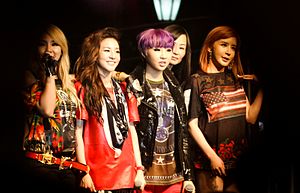 Korean Popular Music (Kpop) Korean Popular Music (Kpop)
K-pop
(an abbreviation of Korean pop; Korean: 가요 kayo) is a
musical genre originating in South Korea that is
characterized by a wide variety of audiovisual elements.
Although it comprises all genres of "popular music" within
South Korea, the term is more often used in a narrower sense
to describe a modern form of South Korean pop music covering
mostly dance-pop, pop ballad, electronic, rock, hip-hop,
R&B, etc.
In 1992, modern K-pop was ushered in with the formation of
Seo Taiji & Boys, whose successful experimentation with
different music styles had sparked a paradigm shift in the
music industry of South Korea. As a result, the integration
of foreign musical elements has now become a common practice
in the K-pop industry.
By tapping into social networking services and the video
sharing platform YouTube, the K-pop industry's ability to
secure a sizable overseas audience has facilitated a
noticeable rise in the global proliferation of the genre.
Since the mid-2000s, the K-pop music market has experienced
double digit growth rates. In the first half of 2012, it
grossed nearly US$3.4 billion, and was recognized by Time
magazine as "South Korea's Greatest Export".
First gaining popularity in East Asia in the late 1990s,
K-pop entered the Japanese music market towards the turn of
the 21st century. In the late 2000s, it grew from a musical
genre into a subculture among teenagers and young adults of
East and Southeast Asia. Currently, the spread of K-pop to
other regions of the world, via the Korean wave, is seen in
parts of Latin America, Northeast India, North Africa, the
Middle East, Eastern Europe and immigrant enclaves of the
Western world.
Source: Wikipedia - K-pop |
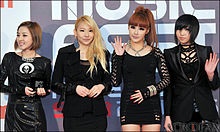 2NE1 2NE1
2NE1 (Korean: 투애니원; pronounced To Anyone or Twenty One) is a
four-member South Korean girl group formed by YG
Entertainment in 2009. The band consists of CL, Minzy, Dara,
and Bom. The name 2NE1 combines the phrases "21st century"
and "new evolution" (NE).
From left to right: Dara, CL, Park Bom, Minzy
Source: Wikipedia - 2NE1 |
 Go Away Go Away |
 I Am The Best I Am The Best |
 Try To Follow Me (Follow Me) Try To Follow Me (Follow Me) |
 Ugly Ugly |
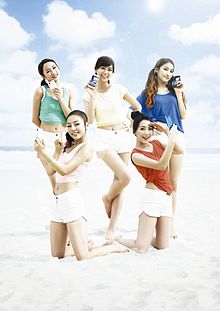 Kara Kara
Kara (Hangul: 카라, Japanese: カラ, often stylized as KARA) is a
South Korean pop girl group formed by DSP Media in 2007. The
group is composed of Park Gyuri, Han Seungyeon, Nicole Jung,
Goo Hara, and Kang Jiyoung. The group's name comes from the
Greek word "chara" (χαρά, lit. "joy"), which they
interpreted to mean "sweet melody".
Top row (from left to right): Nicole, Seungyeon and Gyuri
Bottom row (from left to right): Hara and Jiyoung
Source: Wikipedia - Kara (band) |
 Mister Mister |
|
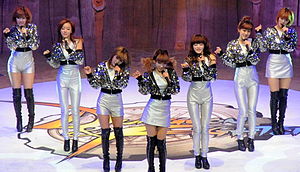 Rainbow Rainbow
Rainbow (sometimes stylized as RAINBOW; Hangul: 레인보우,
Katakana: レインボー) are a 7-member South Korean girl group
signed to DSP Media. The members are frontwoman Jae Kyung,
Go Woo Ri, Cho Hyun Young, Kim Ji Sook, No Eul, Oh Seung Ah,
and Jung Yoon Hye.
Source: Wikipedia - Rainbow (South_Korean_band) |
 A (Korean Version) A (Korean Version)
A (Japanese Version)
A (Sexy Version) |
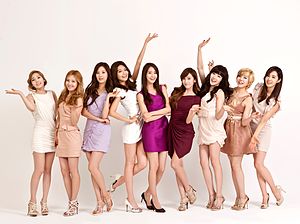 Girls'
Generation Girls'
Generation
Girls' Generation is a South Korean girl group formed by S.
M. Entertainment in 2007. The nine member group consists
of Taeyeon, Jessica, Sunny, Tiffany, Hyoyeon, Yuri, Sooyoung,
Yoona and Seohyun.
The group gained attention at the beginning of their career
with songs such as "Into the New World" and "Kissing You"
but it was not until 2009 when they gained significant
popularity with their hit single "Gee", which would be named
as South Korea's "Song of the Decade".
From left to right: Taeyeon, Hyoyeon, Seohyun, Sooyoung,
Yoona, Jessica, Tiffany, Sunny and Yuri.
Source: Wikipedia - Girls' Generation |
 少女時代 (Mr. Taxi) 少女時代 (Mr. Taxi) |
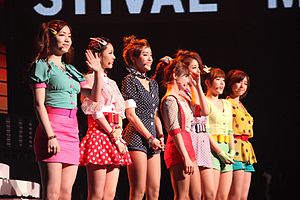 T-ara T-ara
T-ara (pron.: /tiˈɑːrə/; Korean: 티아라, Japanese: ティアラ, often
stylized as T-ARA or T♔ARA) is a South Korean girl group
that debuted in 2009 under Core Contents Media. Before their
debut, there was a high level of interest in the group; they
were called the "Super Rookies" and had been training for
three years.
From left to right: Hwayoung, Qri, Hyomin, Boram, Jiyeon,
Soyeon, Eunjung
Source: Wikipedia - T-ara |
 Bo Peep Bo Peep Bo Peep Bo Peep |
|
 PSY
- Park Jae-sang PSY
- Park Jae-sang
Park Jae-sang (born December 31, 1977), better known by his
stage name Psy (Korean: 싸이, IPA: [s͈ai]; English: /ˈsaɪ/
SY), stylized PSY, is a South Korean singer, songwriter,
rapper, dancer, and record producer. Psy is known
domestically for his humorous videos and stage performances,
and internationally for his hit single "Gangnam Style." The
song's refrain "Oppan Gangnam Style" (translated as "Big
brother is Gangnam style", with Psy referring to himself)
was entered into The Yale Book of Quotations as one of the
most famous quotes of 2012.
On October 23, 2012, Psy met UN Secretary General Ban Ki-moon
at the United Nations Headquarters where Ban expressed his
desire to work with the singer because of his "unlimited
global reach". On December 21, 2012, at around 15:50 UTC,
his music video for "Gangnam Style" exceeded 1 billion views
on YouTube, becoming the first and currently only video to
do so in the website's history. Psy was subsequently
recognized by the media as the "King of YouTube".
Source: Wikipedia - Psy (entertainer) |
 강남스타일 (Gangnam Style) 강남스타일 (Gangnam Style) |
|
|
|

